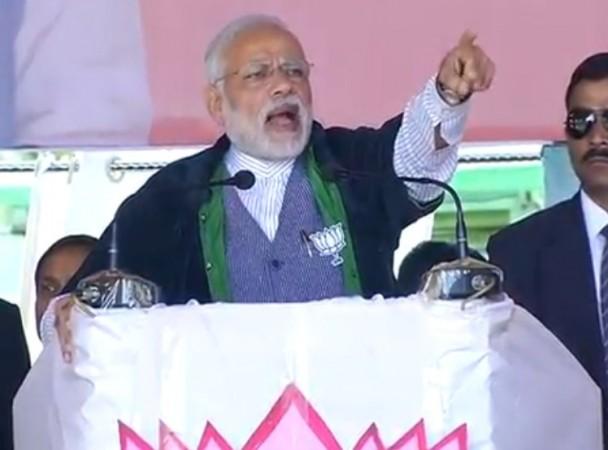
Prime Minister Narendra Modi's work was made easy by a man from his opposition: Mani Shankar Aiyar who had once humiliated the former at a Congress event describing him as a tea seller. The insult had given the BJP leader, who was the National Democratic Alliance's (NDA), the most potent weapon to bag the victory he was eyeing in the Lok Sabha elections that followed a few months later. The "tea seller" jibe had elevated Modi's stature to such an extent that he eventually dwarfed the political elite which has been dominating the corridors of power in Lutyens for several decades.
That Modi had found a much-needed advantage post Aiyar's comment was clear after he remarked at a rally in Vandalur in Tamil Nadu ahead of the 2014 Lok Sabha election that the country is run by hard work and not Harvard. His target was P Chidambaram, the Congress's West-educated leader and the then finance minister of the country who had ridiculed Modi's knowledge on economics. Directly challenging Chidambaram, Modi had said he hails from a poor background in a small village while Chidambaram is educated from a big university. The 'hard work versus Harvard' analogy was crafted by the prime minister in a very effective way as he knew that the more people from a tainted regime mocked him, the higher was his chance of rising in the eyes of the common man.
Modi's 'hard work' is a slogan to mock the elite
He, hence, projected him more as a common man's representative and this episode had turned the traditional communal-secular debate between the BJP and Congress into an elite-subaltern one and there could only be one beneficiary from it in today's deeply democratised India and that is Modi. It's not that the BJP leader was the only competitor in the race to become the common man's best friend as the likes of Mamata Banerjee, Arvind Kejriwal and Rahul Gandhi (who was also trying his best to emerge as a leader of the aam aadmi despite an elitist background) but the mood of the day was with the NDA's PM candidate and he eventually prevailed.
Modi has not allowed the tool to rust even after becoming the PM
Fast forward to 2017 and Modi, now the prime minister, revived the same 'Hardvard versus hard work' rhetoric relevant during yet another crucial election – in Uttar Pradesh. This time, his targets were people like Amartya Sen who had severely criticised his demonetisation drive in November. Modi took a dig at Harvard after a progress report on his government's demonetisation came out for not only professor Sen is associated with the prestigious institute but also because another professor Bhaskar Chakravorti had evaluated the demonetisation drive in a negative light in a review in a Harvard publication.
Now, the question is: How hard work is comparable against Harvard? Do Harvard-educated not work hard? It is still understandable when Modi had first used the analogy against his tainted political opponents prior to a big election in 2014. But why did he use the same against apolitical people in 2017?
But why make hard work an anti-thesis to education?
The second utterance of this analogy speaks about something sinister. First of all, by mocking Harvard and pitching for his own "hard work", the prime minister rubbished the significance of education in one stroke. Professor Sen was insulted by the chief of the BJP in West Bengal, the state to which Sen belongs, as "spineless" and somebody who did nothing. Now, the topmost leader of the same party has endorsed the same insult. For the subaltern, this is the best possible way to challenge and defeat a knowledgeable opponent/critic – by undertaking the route of populism which the common man finds much easily digestible than intricate theories propounded by specialists.
Modi's second strategy to convince his constituencies about his leadership is by making lack of education and hence understanding as something insignificant. This is a boon (or bane?) of democracy. No matter how India's economic fortunes have shaped up in the last 70 years, there is no doubt that socio-politically, our democracy has made a strong penetration. Despite lack of satisfactory development in key fields like education, political empowerment alone has given the people of the country enough scope to turn strong judges.
(My) Ignorance is as good as (your) education?
As a complete anti-thesis to the Nehruvian democracy, today's Modified democracy believes in post-truth where "my ignorance is as good as your knowledge". Hence, there is little surprise when the heights of Harvard are brought down in the nooks and corners of Uttar Pradesh. It's the vote that matters for Modi at the end of the day and he requires no theories from the West to convince the gullible voters.
A third political strategy executed through this analogy is finding an enemy in education. For a regime which is busy establishing contrast and competition among everything under the sun – be it between tolerance and nationalism, secularism and Indianness or education and hard work. This is a clever tactic to win majoritarian hearts these days, although it is always fraught with risk.

















